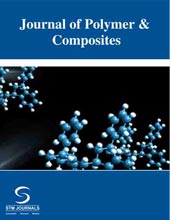Open Access

D.K. Thirumalazhagan,

S. Soundararajan,

SK Nayak,
- B.Tech Student Department of Plastics Technology, Central Institute of Petrochemicals Engineering and Technology (CIPET) Tamil Nadu India
Abstract
Low density poly ethylene (LDPE) and Poly lactic acid (PLA) in the ratio of 70:30 wt% were blended along with ethylene glycidyl meth acrylate (EGMA) as compatibilizer (2.5%), benzophenone as photodegradable additive (1%) and microclay (1,3,5%) as filler. Blending took place in a twin-screw extruder and then the resulting blend was processed into a film using blown film extrusion. Mechanical, optical, barrier and degradative properties of film were tested as per ASTM Standards. The sample with 5% microclay has better mechanical properties than samples with 1% and 3% microclay; however, the 5% sample also has lower luminous transmittance and higher haze. OTR and WVTR were lowered with the addition of clay. SEM shows that the microclay is distributed/dispersed well. The EGMA works as good reactive compatibilizer and hence uniform flow, uniform phase behaviour and uniform properties is obtained. Hence this LDPE-PLA blend is miscible one. LDPEPLA blend with microclay will be photo /biodegradable in the presence of Benzophenone and PLA in the environment because LDPE in presence of benzophenone is photodegradable and PLA is biodegradable.
Keywords: LDPE, PLA, EGMA, Microclay, Mechanical, optical, Barrier properties and SEM/DSC
References
1. Sionkowska. Current research on the blends of natural and synthetic polymers as new biomaterials: Review. Prog. Polym. Sci. 2011; 36 (9): 1254–1276.
2. Anderson. K.S., M.A. Hillmyer. The influence of block copolymer microstructure on the toughness of compatibilized polylactide/polyethylene blends. Polymer. 2004; 45 (26): 8809–8823.
3. Ghosh. S, Viana. J.C, Reis. R.L., et al. The double porogen approach as a new technique for the fabrication of interconnected poly(L-lactic acid) and starch based biodegradable scaffolds. J. Mater. Sci.: Mater. Med. 2007; 18 (2): 185–193.
4. Hamad K, Kaseem M, Deri F. Rheological and mechanical characterization of poly(lactic acid)/polypropylene polymer blends. J. Polym. Res., 2011; 18(6): 1799–1806.
5. Ishigaki. T, Sugano. W, Nakanishi. A, et al. The degradability of biodegradable plastics in aerobic and anaerobic waste landfill model reactors. Chemosphere. 2004; 54 (3): 225–233.
6. Kareem M, Hamada K, Dari F. Thermoplastic starch blends: A review of Recent works. Polyp. Sci., Ser. A. 2012; 54 (2): 165–176.
7. Liu P, Ouyang Y, Xiao R. Fabrication and morphology development of isotactic polypropylene nanofibers from isotactic polypropylene/polylactide blends. J. Appl. Polym. Sci. 2012; 123 (5): 2859–2866.
8. Huda MS, Drzal L.T, Mohanty A.K, et al. Chopped glass and recycled newspaper as reinforcement fibers in injection molded poly(lactic acid) (PLA) composites: A comparative study.Compos. Sci. Technol. 2066; 66 (11-12): 1813–1824.
9. Lewitus D, McCarthy S, Ophir A, et al. The effect of nanoclays on the properties of PLLA-modified polymers part 1: mechanical and thermal properties. J. Polym. Environ. 2006; 14 (2): 171–177.
10. Wang Y.L, Hu X, Li H, et al. Polyamide-6/Poly (lactic acid) Blends Compatibilized by the Maleic Anhydride Grafted Polyethylene-Octene Elastomer. Polym-Plast. Technol. 2010; 49 (12): 1241–1246.
11. Yoo T.W, Yoon H.G, Choi S.J, et al. Effects of Compatibilizers on the Mechanical Properties and Interfacial Tension of PolyPropoylene and Polylactic acid Blends. Macromolecular Research. 2010; 18 (6): 583–588.
12. Jacobsen, S., Fritz, H.G. Plasticizing Polylactide–The effect of different plasticizers on the mechanical properties. J Polym Eng. Sci. 2004; 39 (7): 1303–1310
13. Yuan.Y, Ruckenstein. E. Polyurethane Toughened Polylactide. Polym. Bull. 1998; 40(4):485-49
14. Kelly S. Anderson, Shawn H. Lim Marc A. Hillmyer. Toughening of polylactide by melt blending with linear low‐density polyethylene. J Appl. Polym. Sci. 2003; 89 (14): 3757–3768 https://doi.org/10.1002/app.12462
15. Kotiba Hamad, Mosab Kaseem, Fawaz Deri, et al. Poly(lactic acid)/low density polyethylene polymer blends: Preparation and characterization. Asia-Pacific Journal of Chemical Engineering. 2012; 7 (S3): 310–316.
16. Henry Ulrich. Raw Materials for Industrial Polymers. Munich: Hanser Publishers; 1988. P75–76 & 195
17. Madhu G., Bhunia H., Bajpai P.K., et al. Mechanical and Morphological Properties of High Density Polyethylene and polylactide blends. Journal of Polymer Engineering. 2014; 34 (9): 813–821.
18. Arul Kumar KP, Soundararajan S. Studies on Mechanical, Barrier, Optical and Physical Properties of LDPE/PLA Blend for Packaging Films. 1st ed. Chennai: Notion Press; 2019.
19. Arul Kumar KP, Soundararajan S. Studies on the mechanical, barrier, optical, and characterization of photo-/biodegradable LDPE-PLA blend with nanoclay for packaging film application. Polymers from Renewable Resources. 2018; 9 (3, 4): 87–102.
20. ASTM Annual Standards, Vol. 08.01-03, Philadelpia, USA

Journal of Polymer and Composites
| Volume | |
| Received | February 17, 2021 |
| Accepted | November 11, 2021 |
| Published | January 11, 2023 |

